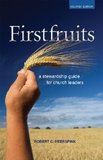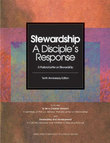Stewardship
Christian stewardship focuses on recognizing all we have as gift from God and how we should respond to that gift. This understanding draws on the term oikonomos, as found in the Synoptic Gospels, the Epistles, and later Christian writings. This word and its variants are used to describe household managers, as found in familiar parables (see Luke 16:1-8 and Luke 16:10-12), as well as civic managers and God's management of the world. Gifts can be understood in a broad sense to include not only material possessions, but also talents, opportunities, relationships, and life itself.
Unfortunately, the term "stewardship" is used very narrowly in most parishes. It is often a code word for financial giving, such as when pastors give annual "stewardship homilies" appealing for money to balance the parish budget. The term is increasingly used to reference contributions of time, talent, and treasure to the parish. However, stewardship is most properly understood as a response to all of God's gifts and not limited to the confines of the parish.
A steward's response to God's gifts comes in three ways. First, one should love oneself by gratefully receiving God's gifts of grace. Second, one should love God by respecting creation and the rest of these gifts; this is done by nurturing and tending these gifts and returning them abundantly to God. Third, one should love one's neighbor by sharing God's gifts justly and charitably.
These responses should be made not only with respect to what we have been gifted with personally, but also as a nation and a global community. These steps have implications for the work we choose, how we spend money, the possessions we accumulate, and the way we treat our environment. I will consider the steps in the next three sections, as they relate to how stewardship can be seen as love of God, self, and neighbor.
Unfortunately, the term "stewardship" is used very narrowly in most parishes. It is often a code word for financial giving, such as when pastors give annual "stewardship homilies" appealing for money to balance the parish budget. The term is increasingly used to reference contributions of time, talent, and treasure to the parish. However, stewardship is most properly understood as a response to all of God's gifts and not limited to the confines of the parish.
A steward's response to God's gifts comes in three ways. First, one should love oneself by gratefully receiving God's gifts of grace. Second, one should love God by respecting creation and the rest of these gifts; this is done by nurturing and tending these gifts and returning them abundantly to God. Third, one should love one's neighbor by sharing God's gifts justly and charitably.
These responses should be made not only with respect to what we have been gifted with personally, but also as a nation and a global community. These steps have implications for the work we choose, how we spend money, the possessions we accumulate, and the way we treat our environment. I will consider the steps in the next three sections, as they relate to how stewardship can be seen as love of God, self, and neighbor.
Key Insights
|
All Is Gift
Stewardship begins with a recognition that all that we have and all that we are are is a gift from God. This seemingly simple realization has implications that are radical, counter-cultural, and far-reaching. Developing Our Gifts
After receiving God's gifts gratefully, a steward will nurture and tend them responsibly. Many gifts may degrade if they are not cared for, but may be developed with some attention. |
First Fruits
The concept of first fruits -- of how the firsts are holy, claimed by God, and redeemable -- runs from the Pentateuch to the epistles. It is at the heart of how we understand Jesus' death, and it has broad implications for how we're called to steward the gifts we receive. Sharing Our Gifts
The response a steward makes that embodies loving our neighbor is to share God's gifts justly and charitably. |
Grace & Receiving
The first response a steward is called to take in response to God's gifts is to receive them gratefully, which requires acknowledging the gifts and their source. Giving and Relationship
Stewards need to be attentive to their relationship to recipients. Are we also able to receive from the one who receives our gifts? Do we feel more righteous or powerful by our giving? What are our real motivations for giving? |
Quotations
A generous person--a steward--is someone who organizes life so God can spend them. Lynn A. Miller
Everyone has a responsibility to answer the call to mission and to develop the gifts she or he has been given by sharing them in the family, the workplace, the civic community, and the parish or diocese. The way we came to know love was that he laid down his life for us; so we ought to lay down our lives for our brothers. If someone who has worldly means sees a brother in need and refuses him compassion, how can the love of God remain in him? Children, let us love not in word or speech but in deed and truth. 1 John 3:16-18
It is a duty and honor for Christians to return to God a part of the good things that they receive from Him. |
I say this not by way of command, but to test the genuineness of your love by your concern for others. For you know the gracious act of our Lord Jesus Christ, that for your sake he became poor although he was rich, so that by his poverty you might become rich. And I am giving counsel in this matter, for it is appropriate for you who began not only to act but to act willingly last year: complete it now, so that your eager willingness may be matched by your completion of it out of what you have. For if the eagerness is there, it is acceptable according to what one has, not according to what one does not have; not that others should have relief while you are burdened, but that as a matter of equality your surplus at the present time should supply their needs, so that their surplus may also supply your needs, that there may be equality. As it is written: “Whoever had much did not have more, and whoever had little did not have less.” 2 Cor 8:8-15
All human beings have unique talents, gifts from God that we are called to develop and share. We should celebrate this diversity. People who use their skills and expertise for the common good, the service of others, and the protection of creation, are good stewards of the gifts they have been given. When we labor with honesty, serve those in need, work for justice and contribute to charity, we use our talents to show our love--and God's love--for our brothers and sisters. |
Church Documents
Books

Stewardship: Disciples Respond:
A Practical Guide for Pastoral Leaders National Catholic Stewardship Council Updated in 2004, this 82 page spiral-bound resource manual is a “hands-on” companion to the United States Conference of Catholic Bishops’ Pastoral Letter on Stewardship, “Stewardship: A Disciple’s Response.” It is a valuable tool that complements any stewardship program. NCSC 
Firstfruits: A Stewardship Guide for Church Leaders
(formerly titled "Becoming a Firstfruits Congregation: A Stewardship Guide for Church Leaders) Robert C. Heerpink This self-directed study guide features 27 brief readings that help readers discover the Bible's wisdom on giving for today from a biblical and Reformed perspective. Includes help with practical follow-up ideas--setting up church budgets, suggestions for personal giving, fundraisers, endowments, and more! Amazon 
Firstfruits Living: Giving God Our Best
Lynn A Miller "Firstfruits living" means giving back to God our lives, living each day as God's servants. This easy-reading stewardship study by Lynn A. Miller will promote lively discussion and renewed living. Amazon |
The Disciple As Steward
Sharon Hueckel A six-week small group study of the Stewardship Pastoral, Stewardship: A Disciple's Response. 
Children's Stewardship Manual
National Catholic Stewardship Council ICSC’s Children’s Stewardship Manual helps dioceses and parishes present stewardship as a way of life to Christ’s “little ones.” Filled with practical tools and suggestions for the young people in your parish! NCSC 
Keeping Stewardship Alive: Proven Stewardship Ideas
National Catholic Stewardship Council ICSC's newest resource containing ideas for effectively promoting stewardship in a parish beyond the first few years. More and more parishes are facing the challenge of presenting the message of stewardship in new and creative ways. This new manual will feature a compilation of innovative ways to promote parish stewardship. It will consist of the following chapters: Communication; Discipleship/Spirituality; Education; Welcoming/Hospitality; Leadership; Renewal of Time, Talent and Treasure. NCSC |
Videos
Articles
- Theology of Stewardship (Bishop Robert Morneau)
- Caring and Sharing: A Guide For Stewardship for Children and Youth (Diocese of Charleston)
Organizations & Websites
- International Catholic Stewardship Council - A professional organization recognized internationally as a source of education, networking and information to advance the ministry of Christian stewardship as a way of life in the Roman Catholic Church, and to promote the cause of Catholic philanthropy in dioceses and parishes worldwide. Extensive set of resources.
- Firstfruits: A Stewardship Guide For Church Leaders - An excellent list of resources, coordinated with Robert C. Heerspink's book of the same name.
- Stewardship Education at Everence - Extensive, solid stewardship resources from the credit union run by the Mennonite church.
- Center For Faith and Giving - The Center for Faith and Giving exists to create a culture of generosity across the life of the whole church. Our Mission is to encourage and promote the understanding of stewardship as a faith discipline and life practice in response to a generous God.


